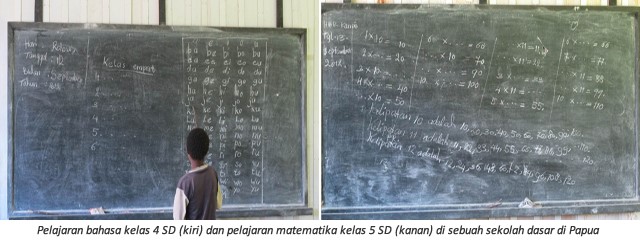Dalam sebuah kunjungan mendadak yang dilakukan oleh tim TNP2K pada September 2012 lalu, ke sebuah Sekolah Dasar di Papua, ditemukan bahwa murid kelas 5 mempelajari soal matematika yang semestinya sudah diajarkan di kelas 2, sementara murid kelas 4 mempelajari soal bahasa yang semestinya sudah diajarkan di kelas 1. Kondisi ini semakin memprihatinkan, setelah ditemui bahwa kedua kelas tersebut diajar oleh seorang guru, yang mangkir selama jam mengajar untuk pulang dan memasak bagi keluarganya. Seorang murid kelas 4 menggantikan peran si guru untuk mengajar teman-temannya mengeja kata, sementara di kelas 5, tidak ada guru.

Dari 12 guru PNS yang mengajar di sekolah tersebut, hanya 3 orang guru yang ada pada saat kunjungan. Menurut informasi dari kepala sekolah, sejak tahun 2006/ 2007, sebagian guru-guru melanjutkan pendidikan mereka. Namun setelah lulus, tidak satu pun dari mereka kembali untuk mengajar. Walaupun demikian, nama mereka masih terdaftar di sekolah tersebut, dan setiap bulan mereka masih menerima gaji dan tunjangan dari Dinas Pendidikan. Kondisi ini tentunya tidak adil bagi para guru yang sehari-hari menjalankan tugasnya mengajar. Padahal, mereka adalah para guru yang memiliki panggilan untuk mengajar. Menurut mereka, walaupun guru di SD tersebut banyak, tapi mereka malas mengajar dan pindah ke kota. Lanjut mereka: “Kesejahteraan guru kurang lancar. Tunjangan daerah terpencil ada, tapi dirahasiakan. Kami harapkan dana kesejahteraan dapat dikirim langsung dari [pemerintah] pusat ke rekening guru.”

Mekanisme penghargaan dan sanksi untuk guru sebenarnya telah diatur dalam Undang-Undang Nomor 14/ 2005 tentang Guru dan Dosen, dan Peraturan Pemerintah Nomor 74/ 2008 tentang Guru. Dinas Pendidikan bisa memberikan surat peringatan dan bahkan menghentikan guru yang sering mangkir. Namun pada kenyataannya sanksi hampir tidak pernah diterapkan karena berbagai alasan. Diskusi dengan Dinas Pendidikan dari beberapa kabupaten di Papua Barat mensinyalir koneksi politis yang dimiliki oleh guru-guru yang mangkir, permasalahan kemangkiran yang sistemik di berbagai sektor kepemerintahan, dan kekhawatiran akan semakin sulitnya mencari guru yang bersedia untuk ditempatkan di daerah terpencil.

"Kesejahteraan guru kurang lancar. Kami mengajar karena kami kasihan dengan anak-anak. Kami harapkan dana kesejaheraan dan sertifikasi guru dapat dikirim langsung dari Pusat ke rekening masing-masing."
✭ ✯ ✰ ✱ ✲ ✳ ❃ ❂ ❁